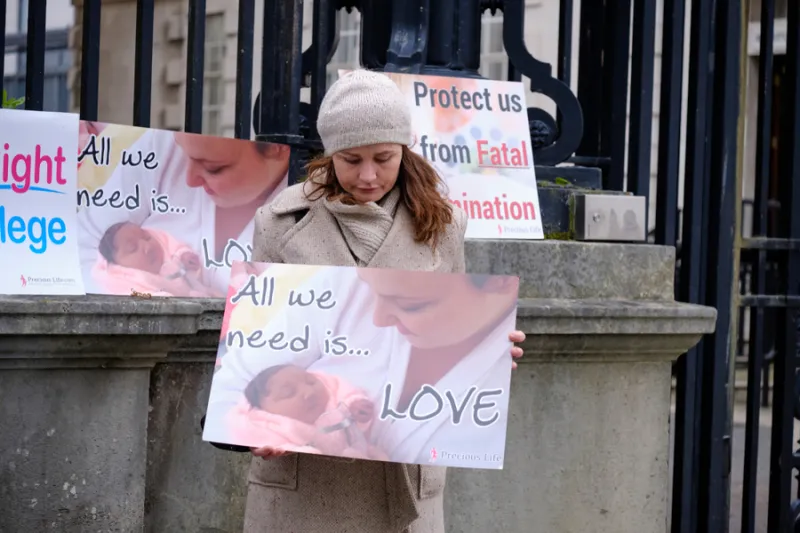
Denver Newsroom, Oct 14, 2021 / 16:01 pm (CNA).
A proposal to require so-called “buffer zones” around abortion clinics – an area where protests would not be allowed – is reportedly drawing support in Northern Ireland’s parliament. If passed, the law, which has progressed past the first legislative stage, would be the first of its kind in the United Kingdom.
The bill would empower the Department of Health to establish “safe access” zones outside abortion facilities, the BBC reported.
Patients and employees of abortion clinics are identified in the bill as “protected persons.” Offenses under the bill would include “influencing a protected person, whether directly or indirectly…preventing or impeding access by a protected person…causing harassment, alarm or distress to a protected person.”
The member of parliament who introduced the bill, Clare Bailey, claimed that while volunteering at a Belfast abortion clinic over 10 years ago, she was “spat at, I had holy water splashed on me, I was verbally abused, I had one young woman who was so distressed she ran into four lanes of oncoming traffic to escape the protestors.”
However, the leaders of a British pro-life group pushed back against claims that harassment outside abortion facilities is commonplace.
“Contrary to the claims of Claire Bailey, the harassment of women and staff outside abortion facilities has been proven to be extraordinarily rare,” said Michael Robinson, executive director of the British pro-life group Society for the Protection of Unborn Children.
“The intimidation of women outside abortion facilities has been proven time and time again to be a lie, while the abuse that pro-lifers have suffered has not been subject to a review at all,” he added, pointing out that a pro-life supporter was assaulted outside a Belfast abortion clinic in June.
Politicians of the Democratic Unionist Party, the leading pro-life party in Northern Ireland, described the bill as “regressive.”
“Under the Bill, anything from a conversation to a leaflet would be deemed criminal. Notwithstanding whether such a definition would be enforceable in practice, that is an incredibly broad scope. Some Members will deem those who hold a pro-life stance as offensive, and others, like me, can consider a pro-abortion stance as equally offensive,” DUP lawmaker Jonathan Buckley said during an Oct. 12 debate on the proposal.
“Neither I nor my party, nor the vast majority of pro-life advocates, have any common cause with those who engage in either aggressive or violent activities, and they should be pursued with the full rigour of the law,” he added.
Proposals for buffer zones around abortion clinics in England and Wales were rejected by the then-British Home Secretary in September 2018, after finding that most abortion protests are peaceful and passive.
The British parliament legalized abortion in Northern Ireland in March 2020. Before then, abortion was legally permitted in Northern Ireland only if the mother’s life was imperilled or if there was a risk of long-term or permanent, serious damage to a woman’s mental or physical health.
The new regulations allow elective abortions up to 12 weeks of pregnancy; abortions up to 24 weeks in cases of risk to the mother’s physical or mental health; and abortion without time limit in cases of severe fetal impairment or fetal fetal abnormality.
After the parliament passed the Northern Ireland (Executive Formation etc) Act 2019 to legalize abortion, the Northern Ireland Assembly was deadlocked due to a dispute between the two major governing parties. As the assembly failed to do business by the Oct. 21, 2019 deadline, the abortion law took effect in March 2020.
The country’s Catholic bishops have called the act “an unjust law,” one “which was imposed without the consent of the people of Northern Ireland.”
The bishops added they are “morally obliged, wherever possible, to do all we can to save the lives of unborn children, which could be lost through abortion, and to protect mothers from the pressures they might experience at the time of an unplanned pregnancy. We trust that you recognise this to be an obligation we all share as concerned citizens and public representatives.”
Brandon Lewis, Northern Ireland’s Secretary of State, issued a formal direction on July 22 requiring the Northern Ireland Executive and Department of Health to make abortion and post-abortion care available in the region by March 31, 2022. A High Court judge in Belfast recently ruled that Lewis had failed to comply with his duties as Secretary of State by not “expeditiously” making abortion available to women in Northern Ireland.
In England, a buffer zone was imposed by Ealing Council, in west London, around a Marie Stopes abortion clinic in April 2018. The zone prevents any pro-life gathering or speech, including prayer, within about 330 feet of the clinic.
The Ealing buffer zone, which was upheld by the Court of Appeal of England and Wales in August 2019, was cited by then-Secretary Sajid Javid as an example of a local government using civil legislation “to restrict harmful protest activities,” rather than a nationwide policy.
Shortly after the Ealing buffer zone was adopted, Bishop Philip Egan of Portsmouth said that “to remove from the environment of the abortion clinics alternative voices is to limit freedom of choice. Indeed, research shows that many women have been grateful for the last-minute support they have thereby received.”
“The imposition of ‘no-prayer zones’ outside clinics – I mean prayerful vigil, not militant or disruptive action – is unhelpful, unjust and unnecessary,” Bishop Egan said.
If you value the news and views Catholic World Report provides, please consider donating to support our efforts. Your contribution will help us continue to make CWR available to all readers worldwide for free, without a subscription. Thank you for your generosity!
Click here for more information on donating to CWR. Click here to sign up for our newsletter.




Leave a Reply